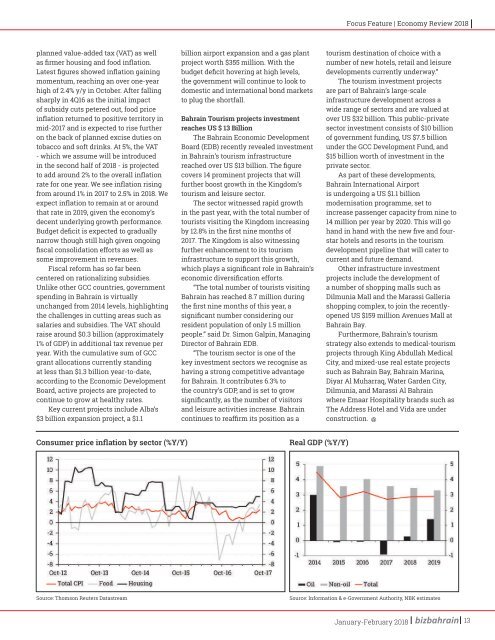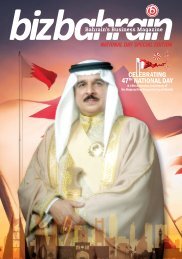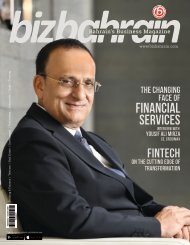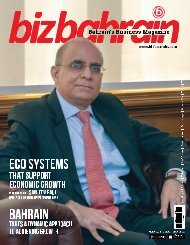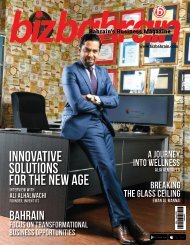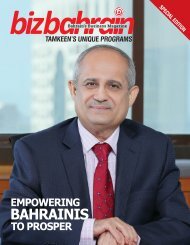Create successful ePaper yourself
Turn your PDF publications into a flip-book with our unique Google optimized e-Paper software.
Focus Feature | Economy Review <strong>2018</strong><br />
planned value-added tax (VAT) as well<br />
as firmer housing and food inflation.<br />
Latest figures showed inflation gaining<br />
momentum, reaching an over one-year<br />
high of 2.4% y/y in October. After falling<br />
sharply in 4Q16 as the initial impact<br />
of subsidy cuts petered out, food price<br />
inflation returned to positive territory in<br />
mid-2017 and is expected to rise further<br />
on the back of planned excise duties on<br />
tobacco and soft drinks. At 5%, the VAT<br />
- which we assume will be introduced<br />
in the second half of <strong>2018</strong> - is projected<br />
to add around 2% to the overall inflation<br />
rate for one year. We see inflation rising<br />
from around 1% in 2017 to 2.5% in <strong>2018</strong>. We<br />
expect inflation to remain at or around<br />
that rate in 2019, given the economy’s<br />
decent underlying growth performance.<br />
Budget deficit is expected to gradually<br />
narrow though still high given ongoing<br />
fiscal consolidation efforts as well as<br />
some improvement in revenues.<br />
Fiscal reform has so far been<br />
centered on rationalizing subsidies.<br />
Unlike other GCC countries, government<br />
spending in Bahrain is virtually<br />
unchanged from 2014 levels, highlighting<br />
the challenges in cutting areas such as<br />
salaries and subsidies. The VAT should<br />
raise around $0.3 billion (approximately<br />
1% of GDP) in additional tax revenue per<br />
year. With the cumulative sum of GCC<br />
grant allocations currently standing<br />
at less than $1.3 billion year-to-date,<br />
according to the Economic Development<br />
Board, active projects are projected to<br />
continue to grow at healthy rates.<br />
Key current projects include Alba’s<br />
$3 billion expansion project, a $1.1<br />
billion airport expansion and a gas plant<br />
project worth $355 million. With the<br />
budget deficit hovering at high levels,<br />
the government will continue to look to<br />
domestic and international bond markets<br />
to plug the shortfall.<br />
Bahrain Tourism projects investment<br />
reaches US $ 13 Billion<br />
The Bahrain Economic Development<br />
Board (EDB) recently revealed investment<br />
in Bahrain’s tourism infrastructure<br />
reached over US $13 billion. The figure<br />
covers 14 prominent projects that will<br />
further boost growth in the Kingdom’s<br />
tourism and leisure sector.<br />
The sector witnessed rapid growth<br />
in the past year, with the total number of<br />
tourists visiting the Kingdom increasing<br />
by 12.8% in the first nine months of<br />
2017. The Kingdom is also witnessing<br />
further enhancement to its tourism<br />
infrastructure to support this growth,<br />
which plays a significant role in Bahrain’s<br />
economic diversification efforts.<br />
“The total number of tourists visiting<br />
Bahrain has reached 8.7 million during<br />
the first nine months of this year, a<br />
significant number considering our<br />
resident population of only 1.5 million<br />
people.” said Dr. Simon Galpin, Managing<br />
Director of Bahrain EDB.<br />
“The tourism sector is one of the<br />
key investment sectors we recognise as<br />
having a strong competitive advantage<br />
for Bahrain. It contributes 6.3% to<br />
the country’s GDP, and is set to grow<br />
significantly, as the number of visitors<br />
and leisure activities increase. Bahrain<br />
continues to reaffirm its position as a<br />
tourism destination of choice with a<br />
number of new hotels, retail and leisure<br />
developments currently underway.”<br />
The tourism investment projects<br />
are part of Bahrain’s large-scale<br />
infrastructure development across a<br />
wide range of sectors and are valued at<br />
over US $32 billion. This public-private<br />
sector investment consists of $10 billion<br />
of government funding, US $7.5 billion<br />
under the GCC Development Fund, and<br />
$15 billion worth of investment in the<br />
private sector.<br />
As part of these developments,<br />
Bahrain International Airport<br />
is undergoing a US $1.1 billion<br />
modernisation programme, set to<br />
increase passenger capacity from nine to<br />
14 million per year by 2020. This will go<br />
hand in hand with the new five and fourstar<br />
hotels and resorts in the tourism<br />
development pipeline that will cater to<br />
current and future demand.<br />
Other infrastructure investment<br />
projects include the development of<br />
a number of shopping malls such as<br />
Dilmunia Mall and the Marassi Galleria<br />
shopping complex, to join the recentlyopened<br />
US $159 million Avenues Mall at<br />
Bahrain Bay.<br />
Furthermore, Bahrain’s tourism<br />
strategy also extends to medical-tourism<br />
projects through King Abdullah Medical<br />
City, and mixed-use real estate projects<br />
such as Bahrain Bay, Bahrain Marina,<br />
Diyar Al Muharraq, Water Garden City,<br />
Dilmunia, and Marassi Al Bahrain<br />
where Emaar Hospitality brands such as<br />
The Address Hotel and Vida are under<br />
construction.<br />
Consumer price inflation by sector (%Y/Y)<br />
Real GDP (%Y/Y)<br />
Source: Thomson Reuters Datastream<br />
Source: Information & e-Government Authority, NBK estimates<br />
January-February <strong>2018</strong><br />
13


